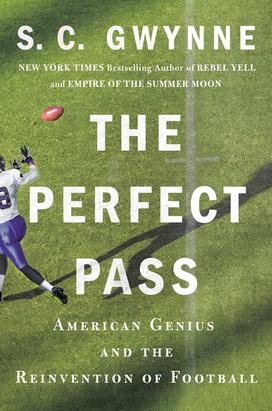S.C. Gwynne ’74 Chronicles a Football Revolution
The book: Hal Mumme had 14 mostly losing seasons coaching football until he invented a passing offense that terrified opposing coaches. His strategy began a football revolution at a tiny college called Iowa Wesleyan with Mike Leach, a lawyer who had never played college football. The pair engineered a revolutionary passing game, called the “Air Raid” offense. Their teams played faster than any team had before and routinely beat teams with more talented athletes — without a playbook. In The Perfect Pass: American Genius and the Reinvention of Football (Scribner), S. C. Gwynne ’74 tells the story of how Mumme changed the game from run-dominated to pass-dominated, thereby transforming it into the football we watch every Sunday.

Opening lines: “The Red Raiders are almost out of time. With 1 minute and 23 seconds left in the game, Texas Tech’s football team trails the University of Texas, 33–32. They have the ball on their own 38-yard line, 62 yards from the end zone, They have one time-out left, but the clock is just one of their problems. Texas is the top-ranked team in the country, loaded with future NFL draft picks … On the Texas sideline you can see that the Horns are juiced. They are chest-bumping. They are jumping up and down. They are screaming. So are the 56,000 Red Raiders fans in the stands, who have watched, agonizingly, as their team’s 22–6 lead has steadily vaporized in the second half. They are desperate to win.”
Reviews: Publishers Weekly calls it “[An] excellent sports history. … Gwynne serves up an intriguing parallel history to football’s pass-dominated renovation. … An inspiring reminder that great ideas don’t automatically permeate the existing ideology.”












No responses yet